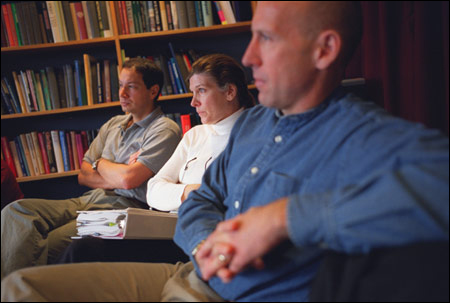Nature/nurture debate considers violent ment
Terminators are made, not born, says USC’s Braudy

Subjects ranged from warrior berserkers to Jessica Lynch as students, faculty, and staff at the John F. Kennedy School of Government engaged in a wide-ranging discussion of masculinity, femininity, and warfare Thursday (Nov. 13) in a lunchtime talk with the author of a new book on the subject.
The event, which packed about 60 people into the School’s Fainsod Room, featured University of Southern California University Professor Leo Braudy. Braudy spoke briefly about his new book, a historical look at the intertwining of warfare and masculinity called “From Chivalry to Terrorism: War and the Changing Nature of Masculinity,” before beginning a discussion with members of the audience.
The talk, titled “Born or Made? Men, War, and History,” was sponsored by the Kennedy School’s Center for Public Leadership.
Though warfare and masculinity have been intertwined through history, Braudy said he believes that males have no inborn predilection to fight. In fact, he points out that men undergo thorough training before they fight and enter combat, often with the threat of harsh penalties for refusing. And being a woman doesn’t necessarily mean you’re a pacifist, he pointed out, saying that through history women have raised sons to be warriors, urging and sometimes even shaming them into battle.
Rather than warfare being an outgrowth of a rigid, predetermined male urge to fight, Braudy rather says that the relationship between ideas of masculinity and warfare are constructed by society and have evolved over recent centuries to reflect changes in society.

“Masculinity develops because of how the state develops and the need to instill in the male population that the best thing you can do for the state is to defend it,” Braudy said.
Though the book deals with terrorism, Braudy started work on the book well before the Sept. 11 attacks. He said he intended the book’s final chapter to be about terrorism, which he sees as another evolution in warfare.
The book grew out of work on an earlier book, “The Frenzy of Renown,” which examines the history of fame from classical times to the present. Though the topics may seem at first to be very different, the fame of military leaders throughout history helped lead Braudy to study warfare.
Warren Bennis, chair of the Center for Public Leadership’s Advisory Board, Thomas S. Murphy Distinguished Research Fellow at Harvard Business School, and Distinguished Professor of Business Administration at the University of Southern California, introduced Braudy as a man whose breadth of knowledge provides Bennis with a personal “continuing education.”
Braudy said the subjects of both fame and of warfare and masculinity are so prominent today that many people believe that their pre-eminence is new or that the modern versions are so changed that historical lessons wouldn’t apply. His efforts, he said, aim to debunk such thinking and show that these issues have been with humankind for centuries.
That said, he also agreed that international terrorism has moved warfare into a new era, with a less-defined enemy who may strike at home as well as abroad.
“We have to rethink our attitudes toward war in Western society,” Braudy said.
One of the most enduring images from the current war on terror so far has been the rescue of Jessica Lynch, which Braudy said provides interesting contradictions for society to resolve. On one hand, he said, Lynch was a woman in the nontraditional role of warrior in a scenario reminiscent of the “leave no one behind” situation in Somalia portrayed in “Black Hawk Down.” On the other hand, she fit the traditional role of a damsel in distress. Braudy added later that he thought Lynch’s most heroic act was admitting she was no hero.
“I think there’s a struggle in the American imagination of how do you talk about women and warfare,” Braudy said.
Braudy said some elements in society have looked at war as cleansing and at traditional masculine virtues as preferable to feminine, which are associated with civilized behavior. In the years before World War I, he said, some looked forward to war as a way to cut through the clutter of civilization that had so diluted basic values.
With the increasing role of technology, the role of the warrior continues to change. Braudy mentioned the U.S. Army’s recruiting campaign “An Army of One” and its emphasis on the impact a single soldier can have, even though the military is more dependent than ever on technology and support functions and less on the combat of the single soldier.
He traces the beginning of this evolution to recruiting posters for World War I, which raised armies for a war that introduced modern technology to warfare, but contained images of knights on horseback.
“In technological societies with millions and millions of people, how can you still make a difference?” he asked.




